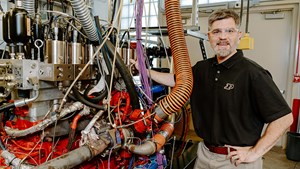Purdue professor researches diesel engine emissions reduction to meet EPA tailpipe requirements
(WO) – Purdue University’s Greg Shaver doesn’t believe there should be a trade-off between protecting the air we breathe and achieving better engine efficiency of large vehicles on the road.

Shaver, a mechanical engineering professor and director of Purdue’s Ray W. Herrick Laboratories, is part of a national effort researching the reduction of carbon dioxide, nitrogen oxide and microscopic particle emissions and improving the efficiency of diesel engines on the road today.
Diesel engines are in everything from large pickup trucks and delivery vehicles to semitractor-trailers. Almost all semis, Shaver said, run on diesel engines.
“There was this expectation even two years ago that you have to trade off nitrogen oxide and particulate matter with carbon dioxide because the work to make the diesel engine cleaner would also make the engine less efficient, resulting in more carbon dioxide,” Shaver said. “But what we’ve shown in our work at Purdue – through support from, and collaboration with, the U.S. Department of Energy and industry leaders Cummins Inc. and Eaton – is there is advanced technology that can be used to improve these important engine and after-treatment systems.”
Shaver’s research has enabled diesel engine efficiency and emissions control through variable valve actuation, or VVA. Heavy-duty vehicles often idle or move slowly, creating increased smog emissions.
Shaver’s VVA allows for increased efficiency of diesel engines, also called compression ignition engines, by utilizing cylinder deactivation and other methods during engine idling, low-load operation and highway cruise conditions. VVA also enables the faster warmup of catalysts for effective reduction of an engine’s nitrogen oxides and microscopic particle emissions.
The diesel engine research at Purdue has resulted in important attention recently from the U.S. Environmental Protection Agency. In December, the EPA finalized stringent new tailpipe emissions requirements for trucks, based in part on research done by Shaver and his team at Herrick Labs.
“Affecting the finalization of more stringent environmental regulations for heavy-duty engines and vehicles is probably the greatest kind of impact that someone with my research focus can have,” Shaver said.
Shaver said the EPA tailpipe emissions regulations will take effect in 2027.
“That’s when the engines have to start meeting these requirements, which seems like a long way away, but it really isn't,” he said. “There’s a lot to do to make these engines work robustly and meet these requirements and demonstrate them.”


